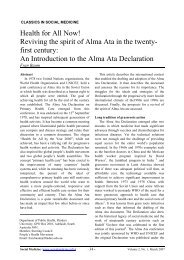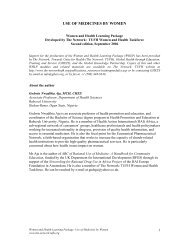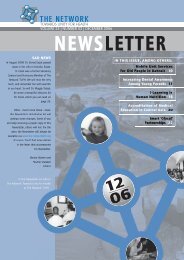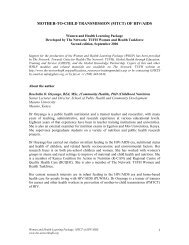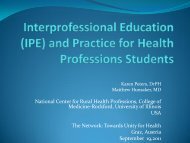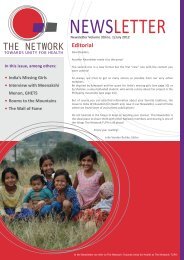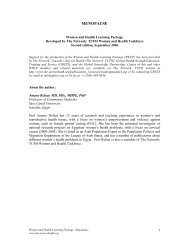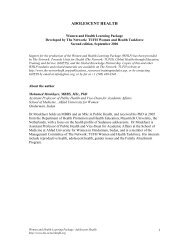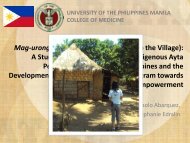Tamas Fülöp Award - The network - Towards Unity For Health
Tamas Fülöp Award - The network - Towards Unity For Health
Tamas Fülöp Award - The network - Towards Unity For Health
Create successful ePaper yourself
Turn your PDF publications into a flip-book with our unique Google optimized e-Paper software.
INTEGRATING MEDICINE AND PUBLIC HEALTH<br />
Policy and Advocacy Integration<br />
into Training<br />
As we write this article, the resounding<br />
words of one of my Network: TUFH (African)<br />
colleagues is triggered. He asked, “What<br />
do you mean when you say ‘Integration<br />
of Public <strong>Health</strong> and Medicine’”. As we<br />
proceeded to explain to him the current<br />
movement to integrate the concepts and<br />
principles of public health in undergraduate<br />
and graduate medical curriculum, he<br />
politely stopped us by asking the simple<br />
question “Don’t all doctors do that”. His<br />
question informed us that medicine has<br />
once again come full circle, within a system<br />
of care, to affect population outcomes and<br />
not just individual patients. <strong>The</strong> simple act<br />
of engaging Family Medicine (FM) residents<br />
in policy and advocacy is a testament of<br />
how we are now revisiting what once was a<br />
norm for healers throughout the world.<br />
Advocacy Efforts<br />
FM residents in the University of New<br />
Mexico’s (UNM) Department of Family and<br />
Community Medicine (DFCM) are engaged<br />
in an effort to affect healthcare outcomes,<br />
not only at the individual level, but at the<br />
community level. <strong>The</strong> FM residents recently<br />
began their advocacy efforts under the tutelage<br />
of Sally Bachofer and Arthur Kaufman.<br />
Daily, FM residents interact with patients<br />
afflicted with ailments and diseases that<br />
are associated with or triggered by ecological<br />
factors or determinants of health. While<br />
generally, we expect that the residents will<br />
be skilled in treating or positively affecting<br />
the bio-medical aspects of the patient,<br />
we recognise that the residents’ education<br />
is equally fuelled by training to create<br />
change through advocacy and/or policy<br />
development. It is not enough to say that<br />
the patient is non-compliant or is not following<br />
the treatment protocol. We must<br />
also train residents to see what aspects of<br />
the patients’ lives might hinder their ability<br />
to comply with the physicians’ treatment<br />
plan. One approach to engaging the FM<br />
residents in community change is through<br />
an active investigation of current policies.<br />
<strong>The</strong> policies may be structured within the<br />
framework of an organisation, agency, clinic,<br />
hospital, and/or within the local, state,<br />
or federal Government.<br />
Competencies<br />
<strong>The</strong> American College of Graduate Medical<br />
Education has restructured the paradigm<br />
of residency education to focus on competencies<br />
and outcomes (www.acgme.org/<br />
outcome/comp/GeneralCompetenciesStan<br />
dards21307.pdf, retrieved June 10, 2008).<br />
<strong>The</strong> Systems Based Practice competency<br />
includes two elements that apply to advocacy<br />
and policy development: “participate in<br />
identifying system errors and implementing<br />
potential system solutions”, and “advocate<br />
for quality patient care and optimal patient<br />
care systems”. <strong>The</strong> UNM residents have<br />
been involved in several initiatives to gain<br />
skills and knowledge aimed at fulfilling<br />
these competencies. Residents may elect<br />
to incorporate the Department of Family<br />
and Community Medicine’s Public <strong>Health</strong><br />
Certificate programme into their curriculum.<br />
Residents are involved directly in policy<br />
and advocacy activities during their clinical<br />
experiences, both in the hospital and<br />
through their continuity clinics. A couple of<br />
policy and advocacy projects in which the<br />
residents were engaged are outlined below.<br />
Projects<br />
Expanded Pharmacy Hours<br />
Patients were frequently admitted to the hospital<br />
because their access to medications was<br />
limited by restricted hours of the University<br />
Pharmacy. After meeting with the pharmacy<br />
staff and investigating other indigent pharmacy<br />
systems, the residents presented a<br />
report to the administration that resulted in<br />
the expansion of pharmacy hours.<br />
Advocacy for Expanded Social Services<br />
Delayed discharges and subsequent overcrowding<br />
of the emergency department<br />
We must also<br />
train residents<br />
to see what<br />
aspects of the<br />
patients’ lives<br />
might hinder<br />
their ability to<br />
comply with<br />
the physicians’<br />
treatment plan.<br />
has a broad impact on hospital function.<br />
By gathering data and learning about the<br />
pertinent management issues, residents<br />
were able to develop a collaborative effort<br />
with the Social Services Department, which<br />
resulted in the recommendation to allocate<br />
funding to new social worker positions<br />
which would help alleviate this situation.<br />
Conclusion<br />
<strong>The</strong> far-reaching impact of resident involvement<br />
in advocacy and policy extends beyond<br />
the individual patient or the focused clinical<br />
experience. <strong>The</strong> population of people whose<br />
healthcare options are negatively impacted<br />
by a particular policy may now be positively<br />
affected at new levels by physicians. At<br />
the academic level, residents who engage<br />
in policy development and advocacy, role<br />
model their behaviour for medical students<br />
to emulate. Physicians are empowered to<br />
liberate themselves from the confines of the<br />
office and impact policy that may contribute<br />
to the well being of not only their patients,<br />
but large populations at one time.<br />
Sally Bachofer, Lily Velarde, Vanessa<br />
Jacobsohn, Amy Clithero, Arthur Kaufman<br />
| Department of Family and Community<br />
Medicine, School of Medicine, University<br />
of New Mexico, USA<br />
Email: livelarde@salud.unm.edu<br />
J U L Y 2 0 0 8<br />
N E W S L E T T E R N U M B E R 0 1 | V O L U M E 2 7<br />
15



